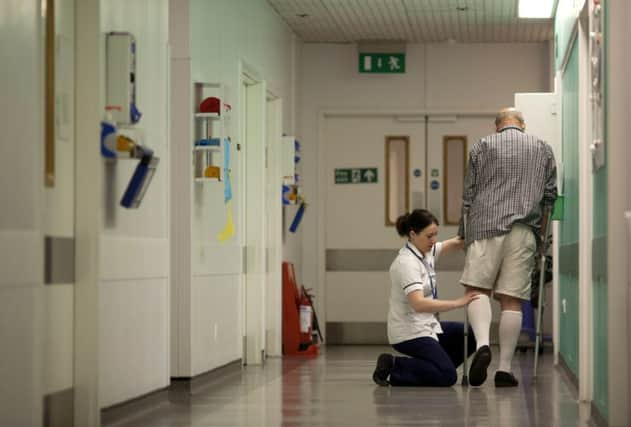Time for care values to include nurses


Many organisations claim to be providing “person-centred care”, where people are supported to make informed decisions about their own health and care depending on individual needs, abilities, lifestyles and goals.
However, appearing with alarming regularity, television documentaries focusing on ill treatment of elderly people in care homes seem to provide evidence to the contrary.
Advertisement
Hide AdAdvertisement
Hide AdWhat has happened to the person-centred approach in these cases?
As with many problems, the solution can be found close to home. As a young staff nurse I was taught that if you want health professionals to excel, then you must treat them with respect. Unfortunately, in the case of many of our nurses across Scotland and the UK, this isn’t the case, and the results are clear: major scandals in our healthcare system, where nurses are swiftly and routinely pilloried for mistakes they have made.
The Scottish Government’s Reshaping Care for Older People plan, written in association with NHS Scotland, sets out the goal of valuing elderly people in Scotland as an asset. Its vision is to ensure that the voices of older people are heard loud and clear, and that living a positive and satisfying life in their own home, or at least in a homely setting, is attainable.
This can only be achieved with the statutory, voluntary, independent and third sectors cooperating with older people and their carers so as to reinforce confidence and capability amongst all parties. These partnerships form the beating heart of person-centred care and must form a basic principle if we want to see both nurses and older people succeed together.
“Person centred-ness” is an approach to care that values therapeutic relationships between all care-providers, elderly people, and their significant others. It is propped up by values of respect for all people in the process and, as individuals, their right to self-determination, mutual respect and understanding.
But are our nurses understood? Are they respected?
Earlier this year, a survey conducted by a large recruitment agency demonstrated that nurses are one of the least satisfied professional groups, and much of that is connected to the way that they are treated. Routinely, we fail to treat nurses as thinking, feeling, human beings – but we expect them to do things that are thinking, feeling, and human (sometimes superhuman).
This is where my hope for personhood comes into play. We must work with healthcare providers to allow nurses to flourish and “become people” in the eyes of the cared-for, not just names on uniforms. Our nurses also need to be provided with psychological safety – only then can we hope to provide the kind of environments in which both patients and professionals fare well.
Nurses need to be accepted for the humans they are: educated, skilled and well-trained people who have friendly, meaningful and close connections with other human beings.
Advertisement
Hide AdAdvertisement
Hide AdWill more regulation, more inspection and more quality standards to which to adhere make those nurses feel safer? Absolutely not.
What nurses need, and what is crucial to person-centred care, is a culture where they can feel that they can connect with people in a meaningful way. Scotland spends a large amount of time educating and training nurses and helping them see the importance of evidence and research, but how are they taught to thrive as human beings? And where does the system provide the space for this to happen?
What evidence has been able to show is that, in care homes, good relationships are central to quality of life, quality of care and quality of management. We must continue to research the best ways to support these relationships. This means focusing not only on the older person being cared for, but also on the needs of the extended care group; this means consideration for relatives and for the nurses themselves; and that support should be given wherever it is required.
There must be a culture of truth, honesty and, furthermore, of trust. If an environment immersed in these values cannot be created for nurses, then all the work that has gone into improving the system may end up meaningless. Nurses need to know that, even when things go wrong, they are valued.
Lastly, collaboration is critical. To truly deliver for Scotland’s older citizens the development of a person-centred culture that embrace person-centred care must be at the heart of all we do as healthcare professionals, allowing for a better healthcare experience for all involved and, possibly, to demonstrate to the wider world that we are leading the way.
• Professor Brendan McCormack is Head of the Division of Nursing, School of Health Sciences, Queen Margaret University
www.qmu.ac.uk
SEE ALSO